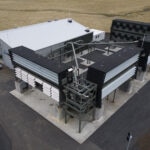‘First-of-a-kind’ (FOAK) is a technological term that refers to the implementation of a ’cleantech,’ or clean technology, for the first time in real conditions and on a commercial scale. These projects mark the transition from experimental development to market adoption and are fundamental to promoting the energy transition and advancing decarbonization.

Examples such as the first solar power plant, the first aerothermal system, or the first electric vehicle factory – currently common technologies – were once disruptive innovations.
In the middle of the cleantech revolution, FOAK projects are becoming increasingly frequent. In Sweden, SSAB is building one of the first green steel factories in the world, with zero greenhouse gas emissions. In Iceland, Climeworks has operated Orca since 2021, the first large-scale facility to capture carbon dioxide (CO₂) directly from the air and store it.
These initiatives allow promising technologies to be validated in real contexts, acting as benchmarks for future investments and similar initiatives. Their value lies not only in technological innovation but also in their ability to establish regulatory, industrial and financial precedents.

Importance of FOAK projects in the energy transition
The term FOAK is not exclusive to the cleantech field, it is also used in economic engineering, where technical and financial principles are combined. ‘First-of-a-kind’ projects refer to the implementation of innovative technologies at a significant commercial scale with the aim of demonstrating their feasibility and advancing from prototype to industrial scale,” explained Bianca Dragomir, Director of Cleantech for Iberia.
According to Dragomir, FOAK projects are critical. They address the problem of scalability in the technologies needed to decarbonize the economy and propel the energy transition. “It is precisely in this phase where Europe is falling behind other competitors: we generate 27 percent of cleantech patents worldwide, yet only seven percent of the products reach the market,” Dragomir added.
Europe generates 27 percent of cleantech patents worldwide
FOAK vs. NOAK: key differences in clean technologies
In the context of technological innovation, in addition to FOAK projects, there are also NOAK, or ‘nth-of-a-kind’ projects. Both terms refer to different stages of large-scale implementation of an innovative technology, while NOAK projects describe the implementation of a technology whose viability has already been proven on several occasions. In other words, while FOAK refers to pioneering projects, NOAK covers projects that work with technologies that have been proven and validated in previous pilots, yet remain innovative and disruptive.
To start to build a green steel factory in Sweden, SSAB had to secure nearly €4.5 billion in financing. Meanwhile, Climeworks has raised €850 million so far for the construction and operation of its carbon capture plant in Iceland. Industrial projects with disruptive technologies require major investments. They also entail elevated risks in the market, execution and technology. Even when these technologies have already been tested in a laboratory or in small pilot plants, their performance and profitability on a large scale are still unknown.
Main financial and regulatory challenges of FOAK projects
“The biggest challenge facing FOAK projects is investment and risk aversion,” noted Bianca Dragomir. “They are large, risky projects for venture capital investors, who tend to seek profitability in five to 10 years, expecting to recover their investment through an initial public offering (IPO) or acquisition. However, this expected return does not align with the life cycle of infrastructure development, which runs from 10 to 20 years.”
According to the director of Cleantech for Iberia, both challenges can be addressed with public support. Implementing robust support plans and risk reduction mechanisms can boost confidence in the private sector. These actions can be key to advancing technologies that are considered strategic. “In particular, I think public guarantees, incentives and blended financing mechanisms should be leveraged to reduce the risk and cost of the loans,” Dragomir explained.
In addition, there are other measures that can be adopted to help clean technologies reach the FOAK stage. Promoting public contracts with climate criteria, streamlining permits for first-of-a-kind assets (especially when there is no precedent in the market) and reducing regulatory and policy uncertainty can improve viability and attract investment, according to the expert.
FOAK projects represent a decisive step in adopting clean, innovative technologies. Despite their financial, technical and regulatory challenges, promoting them is key to accelerating the decarbonization of the economy and mitigating climate change. Making green steel or carbon capture as common as a solar power plant or electric vehicle requires close collaboration between the public and private sectors.